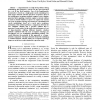136 search results - page 8 / 28 » Using Rewarding Mechanisms for Improving Branching Heuristic... |
HPCA
2007
IEEE
14 years 7 months ago
2007
IEEE
Task-selection policies are critical to the performance of any architecture that uses speculation to extract parallel tasks from a sequential thread. This paper demonstrates that ...
CEC
2009
IEEE
14 years 2 months ago
2009
IEEE
— A hyperheuristic is a high level problem solving methodology that performs a search over the space generated by a set of low level heuristics. One of the hyperheuristic framewo...
SAMOS
2007
Springer
14 years 1 months ago
2007
Springer
— General purpose architectures are designed to offer average high performance regardless of the particular application that is being run. Performance and power inefficiencies a...
ISCA
1998
IEEE
13 years 11 months ago
1998
IEEE
Modern processors improve instruction level parallelism by speculation. The outcome of data and control decisions is predicted, and the operations are speculatively executed and o...
GECCO
2006
Springer
13 years 11 months ago
2006
Springer
In reinforcement learning, an agent interacting with its environment strives to learn a policy that specifies, for each state it may encounter, what action to take. Evolutionary c...

